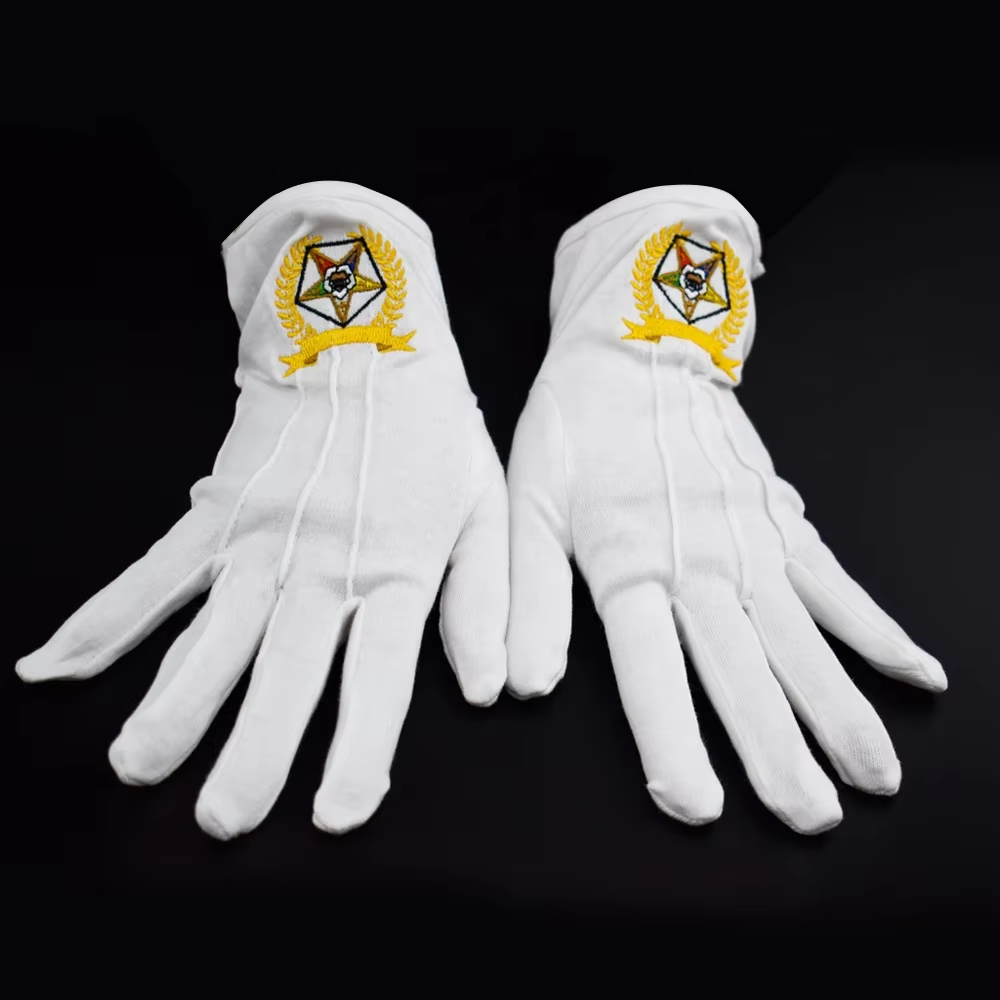Freemasonry is filled with rich symbolism, timeless traditions, and meaningful rituals. Among its many regalia items, Freemason gloves hold a unique place. While to outsiders they may appear as simple white gloves, within the fraternity they carry deep spiritual and moral meaning. For centuries, these gloves have been worn as symbols of purity, equality, and brotherhood reminding Freemasons of their obligations both inside and outside the lodge.
This article explores the history, symbolism, and modern use of Freemason gloves, along with practical guidance on their care, purchase, and significance as Masonic gifts.
The Historical Origins of Freemason Gloves
The origins of Masonic gloves go back to the days of operative stonemasons. In medieval Europe, working masons wore gloves made from leather or cloth to protect their hands while carving stone. Just as aprons shielded their bodies from dust and debris, gloves safeguarded their hands from injury.
When Freemasonry evolved into a speculative society during the 16th and 17th centuries, many tools and garments of operative masons were retained but reinterpreted symbolically. Gloves transitioned from being purely protective to carrying moral and spiritual meaning.
One of the earliest written references to Freemason gloves comes from a 1736 account of a French initiation ceremony, where new members were presented with a pair of white gloves as part of their regalia. This tradition spread across Europe and became firmly embedded in Masonic ritual.
Symbolism of Freemason Gloves
Every piece of Masonic regalia has a symbolic purpose, and gloves are no exception.
- Purity and Clean Hands
White gloves symbolize purity of action and integrity. A Mason should perform deeds with “clean hands,” free from corruption or dishonesty. - Equality Among Brothers
Regardless of wealth or status, every Mason wears the same gloves. This reminds members that within the lodge all stand equal, united by brotherhood rather than divided by rank. - Moral Conduct
Gloves act as a metaphorical reminder to handle all tasks both in the lodge and in life with honor and morality. - Universal Symbolism
Gloves as symbols of cleanliness and morality appear in other traditions too. For example, clergy members often wear white gloves during religious ceremonies for the same reason.
Freemason Gloves in Rituals and Ceremonies
In many Masonic jurisdictions, gloves are worn during initiation ceremonies. A candidate may be presented with a pair of white gloves upon entering the fraternity. These gloves represent his commitment to live a virtuous life and to perform good works with clean hands.
During meetings and rituals, members often wear gloves as part of their full regalia, especially in European lodges. While some American lodges have relaxed this custom, many still uphold it on formal occasions.
Regional practices vary:
- English Freemasonry – Gloves are optional in many lodges today.
- French and Continental Lodges – Gloves remain a mandatory part of Masonic dress.
- Scottish Rite and Higher Degrees – Gloves may be embroidered with symbols, adding deeper layers of meaning.
Types of Freemason Gloves
Not all Freemason gloves are the same. Different types exist depending on tradition, ceremony, and personal preference.
Traditional White Cotton Gloves
These are the most common. Simple, affordable, and widely available, they are often used in regular lodge meetings.
White Leather Freemason Gloves
Leather gloves offer a more formal and durable option. They are often preferred in European lodges or for special ceremonies.
Embroidered Freemason Gloves
Some gloves are adorned with Masonic symbols such as the Square and Compass, the Letter G, or lodge numbers. These are typically reserved for senior members or important occasions.
Personalized Freemason Gloves
Custom gloves may include initials, dates, or lodge insignia. These are often given as gifts to mark milestones or achievements.
Comparison Table: Types of Freemason Gloves
| Type of Glove | Material | Common Use | Symbolism Level |
| White Cotton Gloves | Cotton | Standard lodge meetings | Basic, universal |
| White Leather Gloves | Leather | Formal ceremonies | High |
| Embroidered Masonic Gloves | Cotton/Leather | Higher degrees, rituals | Enhanced symbolic |
| Personalized Gloves | Cotton/Leather | Gifts, anniversaries | Personal, unique |
Freemason Gloves as Masonic Regalia
Gloves form part of the broader collection of Masonic regalia. Together with aprons, collars, and jewels, gloves help complete the ceremonial attire.
- Apron – Symbolizes labor and the honor of a Mason’s work.
- Gloves – Symbolize purity in action.
- Sashes and Collars – Represent rank and office.
- Jewels – Indicate a Mason’s duties.
The harmony between these items reinforces the fraternity’s values. Just as aprons protect against physical stains, gloves remind members to avoid moral stains.
Modern Use of Freemason Gloves
Do Freemasons still wear gloves today? The answer depends on the lodge.
- In Europe, especially France and Germany, gloves remain a compulsory part of Masonic regalia.
- In North America, many lodges consider them optional, with some reserving them only for formal ceremonies.
- In Latin America, gloves are still strongly tied to ritual and symbolism.
Despite differences, the symbolic meaning endures everywhere: gloves remind Freemasons of purity, equality, and moral conduct.
Where to Buy Freemason Gloves
Finding the right pair of Freemason gloves is easier today thanks to online suppliers and Masonic stores. When buying, consider:
- Fabric type – cotton for affordability, leather for formality.
- Plain or embroidered – depending on lodge requirements.
- Sizing and comfort – proper fit ensures gloves don’t distract during ceremonies.
- Lodge-specific rules – some lodges have strict requirements.
Popular sources include:
- Dedicated Masonic regalia shops
- Online marketplaces like Amazon and Etsy
- Lodge gift shops and suppliers
Caring for Freemason Gloves
To maintain ceremonial appearance, Freemason gloves require proper care.
- Cotton Gloves – Wash gently in mild detergent and air dry. Avoid bleach.
- Leather Gloves – Use a damp cloth for cleaning and apply leather conditioner. Store in a cool, dry place.
- Storage – Keep gloves in a clean pouch or box to avoid dust or discoloration.
Regular care not only prolongs their lifespan but also keeps them dignified for lodge use.
Freemason Gloves as Gifts
Gloves are often exchanged as Masonic gifts because they carry deep symbolic meaning. They represent brotherhood, respect, and shared values.
Occasions when gloves make meaningful gifts include:
- Initiations – welcoming a new Mason into the fraternity.
- Anniversaries – commemorating years of membership.
- Promotions in Rank – honoring advancement to higher degrees.
Custom embroidery such as initials, dates, or lodge emblems adds a personal touch that makes the gift memorable.
Frequently Asked Questions About Freemason Gloves
Why are Freemason gloves always white?
White represents purity, integrity, and moral cleanliness.
Do all lodges require gloves?
No. Some lodges, particularly in North America, make them optional, while others in Europe consider them mandatory.
Can a non-Mason gift Freemason gloves?
Yes.
Are there female Freemason gloves?
Yes. Female Masonic orders also use gloves, often in the same symbolic white color.
Conclusion – The Enduring Significance of Freemason Gloves
Though they may seem like simple accessories, Freemason gloves embody profound symbolism. They represent purity, equality, and moral conduct, reminding Masons of their responsibilities within the lodge and beyond. Whether cotton or leather, plain or embroidered, these gloves continue to serve as timeless reminders of the fraternity’s core values.
Even in modern times, where some lodges have relaxed dress codes, the presence of gloves remains a powerful connection to centuries of tradition. In this sense, Freemason gloves are not just part of Masonic regalia they are a statement of character and brotherhood.

